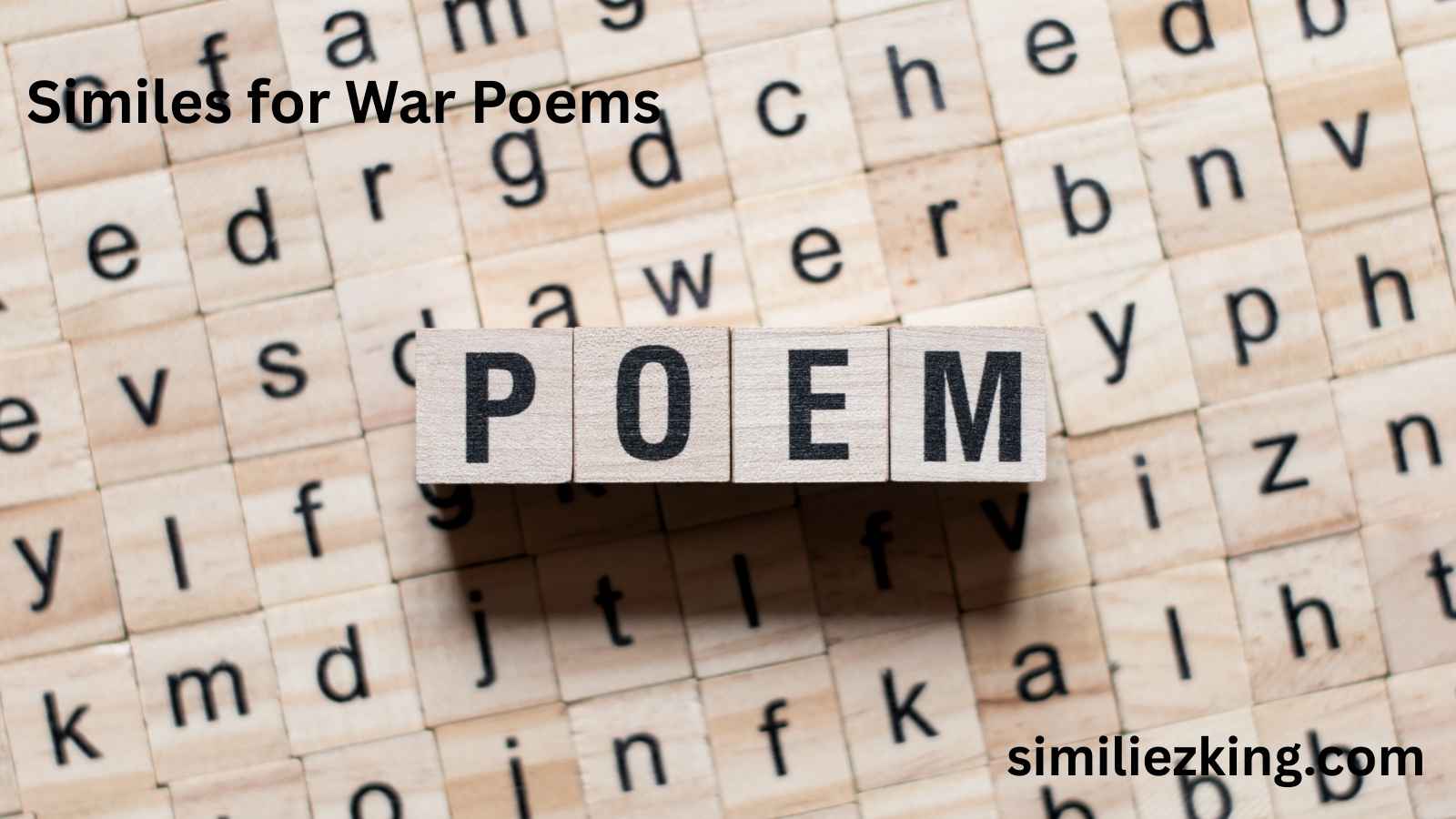In the realm of poetry, similes are a powerful literary device. They allow poets to create vivid imagery and evoke emotions in the reader’s mind. In war poems, where themes of violence, heroism, loss, and resilience often prevail, similes help convey these intense emotions and set the tone for the reader. War poetry requires a delicate balance in its language to accurately depict the complexity of warfare. The right simile can intensify the atmosphere, creating an emotional resonance that enhances the experience of reading.
This article will explore 10+ similes for war poems, offering various alternatives to describe the grim, heroic, or turbulent nature of war through poetic comparisons. Whether you’re writing a formal war poem or a more casual reflection, this guide will help you choose the perfect simile depending on the tone and message you wish to convey.
Understanding the Power of Similes in War Poems
Similes, in essence, are comparisons between two unlike things, often using the word “like” or “as.” In the context of war poems, similes can add depth to descriptions and clarify the complexities of conflict. The beauty of similes lies in their ability to take an abstract or challenging concept—like the experience of war—and make it tangible to the reader.
For example, a simile comparing the sound of artillery fire to the roar of thunder helps the reader visualize the soundscape of a battlefield, bringing it closer to their sensory experience.
In war poems, similes can be used to convey:
- The brutality of war: Describing weapons, soldiers, or battles in a way that highlights the intensity and harshness.
- The heroism of soldiers: Showing strength, bravery, or determination through vivid comparisons.
- The emotional turmoil: Comparing the anguish of war to natural disasters, such as storms or earthquakes.
- The aftermath of war: Describing the desolate landscapes, the loss, and the trauma left in its wake.
By exploring different similes for war poems, you can choose the most effective imagery for the emotions or messages you want to convey.
10+ Similes for War Poems
- “As relentless as a crashing wave”
This simile evokes the unstoppable force of war. Waves are powerful, and their relentless nature reflects the persistence of battle. It can symbolize the chaos of war, continuously breaking against those caught in it. - “As silent as a graveyard”
Often used to describe the stillness after a battle, this simile conjures an eerie quiet, representing the absence of life and the weight of death. It works well in depicting the aftermath of a war. - “Like a lion’s roar in the distance”
A simile representing the fearsome sound of battle or the battlefield itself. A lion’s roar is a powerful, commanding sound, perfect for describing the terrifying noise of war. - “As bright as a burning field”
This simile can describe the destruction of war. A burning field represents devastation, both physical and emotional, and the brightness is symbolic of the blinding intensity of conflict. - “Like a storm brewing on the horizon”
This simile captures the tension before the outbreak of war. It conveys the sense of anticipation and impending destruction, much like the calm before the storm. - “As sharp as a sword’s edge”
Often used to describe the harshness of war, this simile represents the precision and brutality of the weapons used in battle. It could symbolize the pain of loss or the cutting nature of war itself. - “Like a ship lost in the fog”
This simile can convey the confusion and disorientation experienced in war. Just as a ship struggles to navigate through a fog, soldiers often find themselves lost in the chaos of battle. - “As fierce as a storm at sea”
Here, the violence of the sea represents the violent clashes of war. The ferocity and unpredictability of the storm mirror the unpredictable nature of conflict. - “Like a thunderous roar shaking the earth”
This simile brings to life the sound of battle, using thunder as a comparison. It captures the overwhelming sound that reverberates through the ground, symbolizing both the power and fear that war can evoke. - “As cold as the silence after the war”
A perfect simile to express the emotional emptiness and desolation left in the wake of battle. The coldness represents the emotional numbness and the haunting absence of life after war. - “Like fire licking at the edges of a forest”
This simile can depict the rapid spread of war, much like fire spreads uncontrollably. It can also symbolize the uncontrollable nature of conflict that consumes everything in its path. - “As heavy as the weight of a soldier’s uniform”
A simile to represent the physical and emotional burden soldiers bear. The weight of their uniform symbolizes the immense responsibility, sacrifice, and toll war takes on a person. - “Like a shattered mirror reflecting broken dreams”
This simile paints the emotional destruction of war. The shattered mirror represents the fractured hopes, while the broken dreams symbolize the lost aspirations caused by conflict. - “As fleeting as a dying ember”
A simile to reflect the transient nature of peace in war. Just as an ember burns out quickly, peace after a war can be short-lived, overshadowed by the tension and violence that return. - “Like a clock ticking down to zero”
A simile representing the inevitable approach of war, symbolizing the countdown to an unavoidable conflict. The ticking of the clock creates a sense of urgency and inevitability.
How to Choose the Best Simile for War Poems
Choosing the right simile depends on the tone, setting, and emotional weight you wish to convey. Here are some guidelines for selecting the best simile:
- For a somber tone: Use similes that evoke death, stillness, and silence. For example, “as silent as a graveyard” or “as cold as the silence after the war.”
- For a violent tone: Opt for similes that highlight intensity and aggression. “As fierce as a storm at sea” or “like a lion’s roar in the distance” work well in these instances.
- For a reflective tone: Use similes that express the aftermath and emotional toll of war, such as “like fire licking at the edges of a forest” or “like a shattered mirror reflecting broken dreams.”
Texting Examples:
- “The battle was as fierce as a storm at sea, each moment more terrifying than the last.”
- “The silence after the war was like a graveyard, still and unyielding.”
- “His courage was as sharp as a sword’s edge, cutting through fear and doubt.”
- “The enemy approached like a lion’s roar, loud and fearsome.”
- “The battlefield was as bright as a burning field, flames rising from every corner.”
- “It felt like a ship lost in the fog, uncertain of where to turn.”
- “Her heart was as cold as the silence after the war, frozen in grief.”
- “The roar of artillery was like thunder shaking the earth beneath us.”
- “The soldier’s resolve was as relentless as a crashing wave, never wavering.”
- “His resolve was as fleeting as a dying ember, soon extinguished by fear.”
- “Like a clock ticking down to zero, we could feel the end of the war approaching.”
- “The fighting raged on, as fierce as a storm at sea, with no signs of slowing down.”
- “War left him as heavy as a soldier’s uniform, burdened with memories too painful to forget.”
- “The aftermath of the battle was as cold as the silence that followed.”
- “The battlefield was like a ship lost in the fog, no clear direction in sight.”
Conclusion:
Similes for war poems are essential tools for creating vivid imagery and emotional resonance in poetry. The comparisons made using similes can evoke the intense emotions, the fear, the bravery, and the suffering experienced during war. When writing war poems, it is crucial to select the right simile based on the tone you wish to set—whether somber, violent, or reflective.



